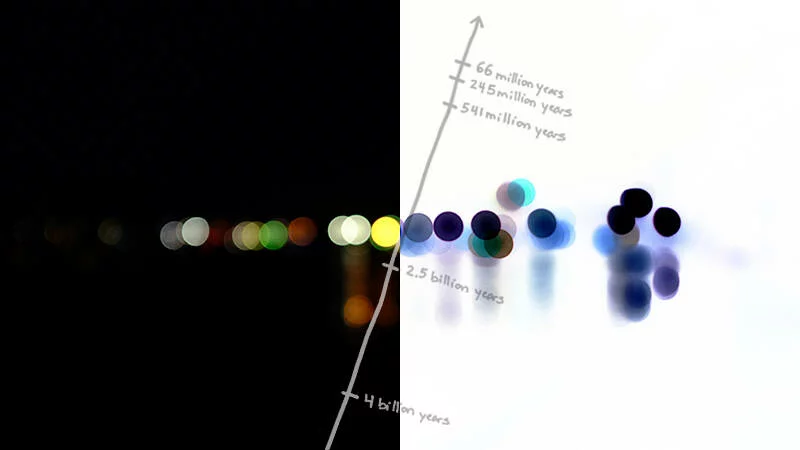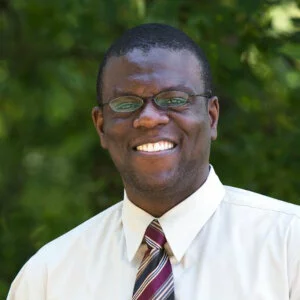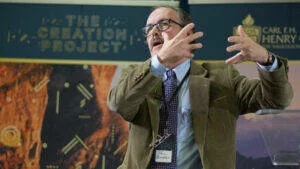 Given your acceptance of the scientific consensus on the age of the cosmos, why do you reject the consensus regarding human evolution?
Given your acceptance of the scientific consensus on the age of the cosmos, why do you reject the consensus regarding human evolution?
So went the original prompt, intended to stimulate discussion on a recurring question faced by old earth creationists. Put another way, is there a consistent way to be an old earth creationist while also rejecting young earth and evolutionary creationism?
It was a pleasure to read these five responses, all adept at showcasing the strengths of their position. In my introduction to an earlier Areopagite on evolutionary creationism, I clarified that my role as moderator is not to inject my own views on the matters at hand. Rather, I’m supposed to function as the tiller, steering the dialogue along, surfacing key questions and allowing the participants to bring fresh insights to the conversation. So let us begin.
Questions for David Snoke
David, I admire your devotion to seek the best arguments in science and theology and your rejection of a blind adherence to the consensus in either discipline. Epistemologically, you have a very disciplined approach to these questions.
My first comment has to do with your description of Scripture and science as the “two books” of God. Did you mean that? Or did you mean Scripture and nature are the two books of God? If you were using your terms advisedly, that seems a much harder proposition to defend. Scripture is God’s Word, but science is nothing of the kind. Science is a human enterprise with all the classic traces of our finitude and fallenness, something you would never say about Scripture.Scripture is God’s Word, but science is nothing of the kind. Science is a human enterprise with all the classic traces of our finitude and fallenness, something you would never say about Scripture. Would it not be more consistent to say, based on Romans 1 and the Christian doctrine of creation, that creation (or nature)—not science—is God’s other book? Peter Hess, for example, writes: “The relationship between science and religion, or nature and faith more broadly, was understood through the metaphor of ‘God’s two books’ of revelation—the books of scripture and nature.”Peter M. J. Hess, “God’s Two Books: Special Revelation and Natural Science in the Christian West,” in Bridging Science and Religion, ed. Ted Peters and Gaymon Bennett (London: SCM, 2002), 124, my emphasis. I suspect you did mean nature and not science, but perhaps you can clarify.
From what I can tell, you think other ancient hominids are nonhuman animals created by God prior to Adam’s creation. Presumably Adam and Eve were supernaturally, or miraculously, created by God—though you don’t say so explicitly. And if that is the case, I would imagine that in your view any genetic and other similarities between our first parents and earlier hominids would imply common design rather than common descent. Right?
Still on this hominid point, what do you make of the genetic evidence that early humans interbred with Denisovans and Neanderthals?E.g., see Sriram Sankararaman, Swapan Mallick, NickPatterson, and David Reich, “The Combined Landscape of Denisovan and Neanderthal Ancestry in Present-Day Humans,” Current Biology 26.9 (2016): 1241-1247. Since you take Denisovans and Neanderthals to be nonhuman animals, how do you interpret this emerging consensus?
One final question: Suppose that new arguments from genetic clocks emerged, all suggesting, strongly, that an original pair is impossible—and suppose that the views of Fuz Rana are no longer plausible. In that scenario, would those scientific arguments be decisive and lead you to revise your interpretation of Adam and Eve in Genesis? Or would such claims, even then, be only one of several data points in your way of thinking?
Questions for Ted Cabal
Your firm commitment to the inerrancy of Scripture shines bright in your response. Ted, I especially appreciate the reminder that our “confidence in our Savior is inextricably linked with the Bible which presents him to us”—those are wise words for evangelicals who want to participate faithfully in the science-theology dialogue.
My first question concerns your “conservatism principle” which you rightly say “has prevailed in the history of science/theology controversies by those holding to the infallibility of the Bible.”You say that Christians initially resist a scientific position; then as the theory gains acceptance, hybrid positions emerge; and eventually, when the scientific theory seems unassailable against traditional interpretations of the Bible, Christians reinterpret the biblical texts. However, your summary gives the impression that conservatism, to a degree at least, is consistent with submitting to the scientific consensus. After all, you say that Christians initially resist a scientific position; then as the theory gains acceptance, hybrid positions emerge; and eventually, when the scientific theory seems unassailable against traditional interpretations of the Bible, Christians reinterpret the biblical texts. By those lights, each step in that trajectory does seem motivated by the growing scientific consensus—or am I missing something?
Furthermore, many Christian biologists believe that the evidence for human evolution is stronger than it ever was. Our good friends at BioLogos would say that the conservatism principle should lead you to reinterpret Scripture to be consistent with human evolution (e.g., see Kathryn Applegate and J. B. Stump, eds., How I Changed My Mind About Evolution: Evangelicals Reflect on Faith and Science [IVP Academic, 2016]). Perhaps my question is, who gets to say when a scientific theory has become certifiably unassailable?
You offer hints at an answer in your main objection to human evolution. Your two main concerns seem to be that Christian evolutionists have a naturalistic methodology and a weak stance on biblical authority. Am I correct? And if that is the case, what’s your own opinion of B. B. Warfield and other Old Princeton theologians—older lights who were fearless defenders of inerrancy and who also accepted (or were open to) supernaturalistic interpretations of human evolution.B. B. Warfield, review of James Orr, God’s Image in Man, Princeton Theological Review 4 (1906): 555-58. Cf. Bradley Gundlach, Process and Providence: The Evolution Question at Princeton, 1845-1929 (Grand Rapids: Eerdmans, 2013). Arguably, their approach to evolution addresses your two main concerns, which leads me to ask: could you endorse human evolution within a supernaturalistic, inerrantist framework? Or is it more complicated than that?
Questions for Ken Keathley
Ken, what a remarkably lucid analysis of the question! I found it very helpful, especially your discussion of the genetic vs. genealogical Adam models. Given the complexity of the issues, I admire the clarity with which you communicated the concepts.
I noticed how you take exception to the common perception that the OEC model would not exist apart from scientific shifts in our understanding of the world. You say, instead, that “the primary driver is the biblical text.”If the primary driver was Scripture, why did the OEC model only emerge after developments in geology? I assume you parse these matters differently. If you’re right, church history seems to raise perplexing questions, given that during the first eighteen centuries most Christians were not concerned with the age of the earth. And the point stands even though plenty of them, especially in the patristic period, happily recognized literary, allegorical, and poetic aspects in the Genesis text. If the primary driver was Scripture, why did the OEC model only emerge after developments in geology? I assume you parse these matters differently.
You also argue that human death—not animal death—was a result of the fall. That remark put me in an eschatological mood and had me wondering whether you think there will be animals in the new heaven and new earth. And if so, do you think animal death will be part of their experience? I couldn’t tell based on what you have said. Since you think that animal death was part of God’s good creation, it’s possible that you would have no problem with animal death in the eschaton. But I’m not sure if that’s your position, especially because the pre-fall age vs. post-parousia eternity are not identical in the biblical narrative.
When you say that “Genesis 1:1-2:3 covers an indefinite period of time”—I’m confused about your justification for this claim. As best I can tell, your argument is that since this portion of Genesis is written in “exalted prose,” we can infer an indefinite period. If I’m reading you right, my next question is whether your conclusion necessarily follows. One might just as easily infer that the exalted prose is compatible with historical narrative; for example, Psalm 105-106 retell the history of Israel in exalted prose (or even poetry!). I could list similar examples throughout Scripture. Maybe you could clarify your understanding of the connection between literary genre and historical reference.
Let’s come back to your analysis of the genetic and genealogical models of Adam and Eve. I was confused when you said you’re “not ready to commit” to either of these two models. According to the genealogical Adam model, other human beings had evolved prior to Adam and Eve—which implies there was human death before Adam and Eve were created de novo. However, earlier in your response, you insist that human death came after the fall of Adam and Eve. Wouldn’t that put you more readily in the genetic Adam model camp?
On a related note, I’m curious to hear your reactions to David’s perspective on Adam and Eve. David seems more confident than you that current science aligns with the traditional picture of Adam and Eve. Is there a material difference on this point between the two of you?
Questions for Tim Morris
Your response offers a rich portrait of the complex methodological and theological factors playing into this conversation. In our current climate with biologists and theologians often pitted against each other, it is heartening to see you embrace both disciplines of biology and theology in a robust way. (Full disclosure—Tim is my colleague at Covenant College.)
Early in your response, you say that you “have come to appreciate an analogical days view of the creation week narrated in Genesis 1 and 2”—in part because of the freedoms it affords (e.g., the overall time frame open). In light of your six categories of judgment, I want to probe a more difficult question. Obviously, many Christians today and even more in the past read the early chapters of Genesis without concluding an analogical days view. If that is true, why have you come to appreciate an analogical days view?I wonder what your fellow scientists would say. Are you opposed to methodological naturalism? Or are you sympathetic to “softer” kinds of methodological naturalism? Your young earth creationist friends might wonder whether extrabiblical concerns—like science—may be impinging on the exegetical options you find most attractive. I welcome your comments on this point. (Regardless, it’s fair to ask whether any of us can escape this hermeneutical interplay! Perhaps it’s the case that any exegesis will necessarily be shaped by extrabiblical concerns, for good or ill; rather than deny that, we should be candid and self-critical.)
Incidentally, you describe yourself as a “soft concordist” and a “progressive creationist.” It may be helpful if you unpack precisely what you mean by those two terms, both of which are open to varied interpretations. You also mention your commitment to “a historical fall by a historical couple”—I’m curious for you to interact with some of the other participants on this issue. For example, what do you make of the genetic vs. genealogical Adam model? How have you processed the claims of interbreeding between humans and other hominid species (e.g., Denisovans and Neanderthals)? How do you see Adam and Eve in relation to these ongoing conversations?
Later in your response, you reject the scientific consensus on universal common ancestry and human origins by “ordinary means” only. If I may ask, why is that your position? Is your stance driven primarily by scientific factors (e.g., you think the scientific consensus has scientific problems), or is it driven primarily by doctrinal factors? Come to think of it, I’m unsure whether you would reject human evolution as such (Ken and Ted reject it in toto). After all, one can envision several scenarios involving human evolution and extraordinary means. Perhaps Adam evolved from earlier ancestors and then God supernaturally implanted a soul. Or, perhaps Adam evolved from earlier ancestors and—simultaneously—God supernaturally instigated the necessary genetic mutations. Do you have any sympathy with scenarios along those lines? Or would you still object to them on other grounds?
Finally, I want to come back to the nature of science. At one point you say that universal common ancestry is undergirded by “a strong methodological naturalism.” You also profess willingness to submit your views on origins to your “church’s proper exercise of authority.” As a theologian, I confess that my heart was strangely warmed as I read those sections! However, I wonder what your fellow scientists would say. Are you opposed to methodological naturalism? Or are you sympathetic to “softer” kinds of methodological naturalism? And, more importantly, some Christian scientists might be very nervous about allowing the church to have “authority” over domains of knowledge—not only does that seem in tension with methodological naturalism, but it also raises questions of jurisdiction, expertise, and so on. No doubt you have further thoughts on these matters.
Questions for Fazale Rana
Fuz, I appreciate the integrity with which you approach God’s book of Scripture and his book of nature. Your creation model is one of the most rigorous approaches that I am aware of that explicitly takes both mainstream science and Scripture seriously.
Constructive integration, the model you describe, is not only attractive to serious Christians, but it raises interesting questions. To begin with, your response cites several studies, drawing from authors who do not reject the standard evolutionary account—e.g., Eörs Szathmáry, István Zachar, et al. And yet, I found it striking that all these authors remain committed to the evolutionary paradigm despite the unanswered questions. They still see their stance as an entirely respectable scientific position. Does this situation have any analogies in the Christian tradition?I’d like to hear your thoughts on the apparent interbreeding between humans and other hominids, specifically Denisovans and Neanderthals (I posed a similar question to some of the other participants). Consider how theologians down the ages have discerned many areas of theological mystery, areas of doctrine that are notoriously difficult—but those are never sufficient grounds for a wholesale rejection of their theological tradition. They learn to live with tension or uncertainty. Likewise, some evolutionists may think constructive integration doesn’t take science seriously enough; just because evolution has residual questions or uncertainties hardly means we should reject it. What would you say to people who worry that you are cherry picking the science when it suits your purposes?
There are epistemological questions too. Does constructive integration imply a level playing field between Scripture and science? You write that constructive integration sets up a dynamic process, one that “draws on insights from Scripture to influence our interpretation of nature’s record, and insight gleaned from nature to influence our interpretation of Scripture.” So, the two options are 1) interpreting Scripture, and 2) interpreting nature—but is either one privileged in some way? Or are they both in the same epistemic boat? Scientists in the wake of the Enlightenment thought science was far more reliable than biblical interpretation (as Exhibit A, they pointed to the fierce disagreements between Protestants). Other Christians think differently, for God promises that he will guide us as we interpret his words, i.e., illumination (e.g., see 1 John 2:20, 27; 2 Cor. 3:14-16, 4:6), but he makes no such promises for our scientific attempts to understand nature. How have you sorted through these issues in your own thinking?
On a more macro level, I would like to hear you reflect on questions that have been raised about concordism. Science is never static; it is always on the move. If a theological system marries the science of its day, it will find itself divorced in a few generations. There is a parallel worry with so-called God of the gaps arguments, a set of approaches that permit Christians to appeal to supernatural explanations whenever science cannot explain a phenomenon. Here’s the niggle: What happens when that scientific gap in our knowledge is later filled? What is the fate of the theological synthesis? I suspect some readers will have such concerns as they read your reflections, though I am certain you will have something interesting to say in reply.
Finally, I’d like to hear your thoughts on the apparent interbreeding between humans and other hominids, specifically Denisovans and Neanderthals (I posed a similar question to some of the other participants). I like your appeal to common design but I’m not sure that it directly addresses this issue. At first blush, it seems as if this question puts you on the horns of a dilemma: you must accept that bestiality was an integral phenomenon in human history, or you must reject how these studies are interpreting the data. A more radical move might be to revise your claim that Denisovans and Neanderthals are not human (an option taken by young earth creationists like Todd Wood). It’s unclear to me which of these options, if any, you would favor.
Back to the Respondents
That should wrap up my Redirect questions. They will be followed by a second round of rejoinders from our five respondents; if those rejoinders are anything like the first spread of appetizers, we are in for a treat. Let me turn it over to David to open the final round of exchanges.







Comments
Be the first one to make a comment!